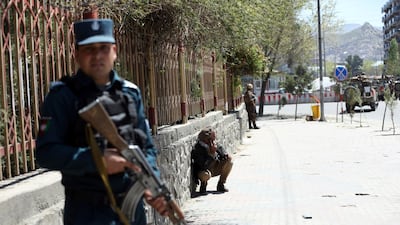Suicide bombers and gunmen laid siege to the building of the Afghan Ministry of Communication and Information Technology (MCIT) in Kabul on Saturday afternoon, killing at least eight people in an assault that destroyed weeks of relative calm in the capital.
The hours-long attack also left at least 10 more wounded, according to the Afghan Interior Ministry. Almost all of the victims were MCIT employees.
According to Nasrat Rahimi, the interior ministry spokesperson, three gunmen entered the building. The attack on the complex, preceded by a suicide bombing, was brought to an end by Afghan security forces who killed all three attackers.
"Operations finished. All suicide bombers killed and more than 2,000 civilian staff rescued," the Minstry of Interior said on Twitter.
The building that came under attack is located in a crowded commercial neighbourhood in the heart of the Afghan capital and is flanked by the Ministry of Information and Culture, the luxury Hotel Kabul Serena, the Afghan post office, and a busy market.
As Saturday is the first working day of the Afghan week, the building itself was crowded with nearly 2,000 employees. Hundreds of workers from the communications ministry, the ministry of information and culture and the central statistics officer were evacuated from the building, along with several young children at a childcare centre for ministry staff.
While no group has yet claimed responsibility for this attack, suspicion will likely fall on the Taliban whose leadership was to meet with Afghan delegates on Friday in an attempt to negotiate peace. However, the talks, scheduled to be held in Doha, fell through due to disagreement over the list of people nominated by the Afghan government for the talks.
But the Taliban has denied responsibility of the attack, saying it had "nothing to do" with the incident. The Kabul Police Chief Sayed Mohammad Roshandil claimed that the assault was an attempt to destroy the MCIT database.
Relatives of those caught up in the attack described how events unfolded and how their family members survived the assault. Shkula Zadran, an Afghan who works with the Swedish Committee for Afghanistan, said that her husband locked himself with colleagues inside a bulletproof safe room.
"His voice was shaking and he couldn't speak properly. The special forces managed to get to them after a few hours," she said.
"We were terrified and all of us were crying. It's so difficult to imagine your beloved ones in such a dangerous situation. I lived through hell today."
Azizullah Ludin, an employee of Afghan financial institution Bank-e-Millie, was 100 metres away in his office when the attack began.
"We heard the explosion a little before noon, and then heard gunshots. We were inside the bank and we left the premises. When we reached a little away, we heard the third explosion," he said.
"I tried to reach my friend who worked there, and he told me he was in the safe room in his office. He said the attackers were firing on the employees."
The communication ministry is located in downtown Kabul, about two kilometres from the green zone, a heavily fortified foreign compound. It is the city's main commercial area and is home to a large hotel.
The ministry itself is an 18-storey building, thought to be the tallest in Kabul.
The explosion comes a week after the Taliban announced their annual spring offensive and amid ongoing fighting across Afghanistan.

